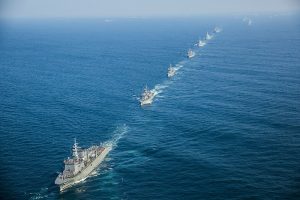South Korea’s Yoon administration still has not decided whether to send its naval ships to Japan’s 2022 International Fleet Review, which will be hosted by the Japanese Maritime Self-Defense Force (JMSDF) next month. The issue is becoming a litmus test for how serious Seoul is about improving relations with Tokyo.
Admiral Sakai Ryo, chief of staff of the JMSDF, said at a press conference on October 25 that South Korea had not yet confirmed whether it would participate in the fleet review, though it is well past the October 12 deadline for responding.
“It’s not like we have already been notified (by the South Korean government) of its non-participation, so we’ll wait until the last minute for its answer,” Sakai said.
The multinational naval fleet review, marking the 70th anniversary of the founding of the JMSDF, is set to take place on November 6 in Sagami Bay, off Tokyo.
In August, Japan’s Kishida administration announced its decision to invite the Republic of Korea Navy (ROKN) to its international fleet review, despite vehement opposition by hawkish Liberal Democratic Party (LDP) lawmakers and more than a few JMSDF members on the spot. They have insisted Tokyo should not be too soft on Seoul because South Korea has never admitted the fact that a ROKN destroyer locked fire-control radar on a JMSDF aircraft in December 2018 and has offered no apology for the incident.
South Korea’s government at the time insisted the destroyer had used general radar for search and rescue purposes. Seoul instead accused the JMSDF aircraft of threatening maneuvers while the destroyer was engaged in a rescue operation involving a small North Korean fishing vessel.
Due to the unresolved incident, the JMSDF didn’t invite the South Korean navy to participate in its last fleet review in 2019. However, the review ended up being cancelled after Typhoon Hagibis.
For its part, when considering the invitation to participate this year, the Yoon administration has to take into consideration the harsh and sensitive public opinion, especially about the JMSDF’s use of the Flag of the Rising Sun. Seoul has argued that the flag reminds South Koreans of Japanese rule and military aggression on the Korean Peninsula between 1910 and 1945.
In turn, Tokyo has said that the flag is the official ensign of the JMSDF and that it is required to hoist the flag under both domestic laws and the United Nations Convention on the Law of the Sea.
In October 2018, the JMSDF dropped out of an international fleet review hosted by South Korea at a military port on the nation’s southern island of Jeju after rejecting Seoul’s request that the JMSDF’s official flag not be flown at the naval event. The JMSDF had planned to send helicopter carrier JS Izumo to the event.
South Korean media have reported the Yoon administration will make a final decision on whether or not it would participate in the event at the National Security Council (NSC) meeting on October 27 and notify the Japanese side of the conclusion.
Although the United States is hoping for a closer trilateral security cooperation between Tokyo, Washington, and Seoul in the face of North Korea’s increasing provocations – and China’s assertive military behavior – historical issues continue to cast a shadow over the rapprochement between Japan and South Korea.
President Yoon Suk-yeol has confirmed his desire to repair ties, but he is confronted with an opposition party that takes a hardline stance against Japan on historical issues. The opposition Democratic Party still controls a majority in the South Korean parliament.
The International Fleet Review is held for the purpose of promoting goodwill among the participating countries, and this year it will be hosted by Japan for the first time in 20 years. In addition to 20 JMSDF vessels, 18 vessels from 12 countries, including the United States, Australia, and India, are scheduled to participate. In June, the Japanese defense ministry announced that it had withdrawn an invitation to Russia in light of Ukraine’s aggression.
The JMSDF said it also had invited China, but had not received any response as to whether it would participate even after the October 12 deadline, just like South Korea.

































